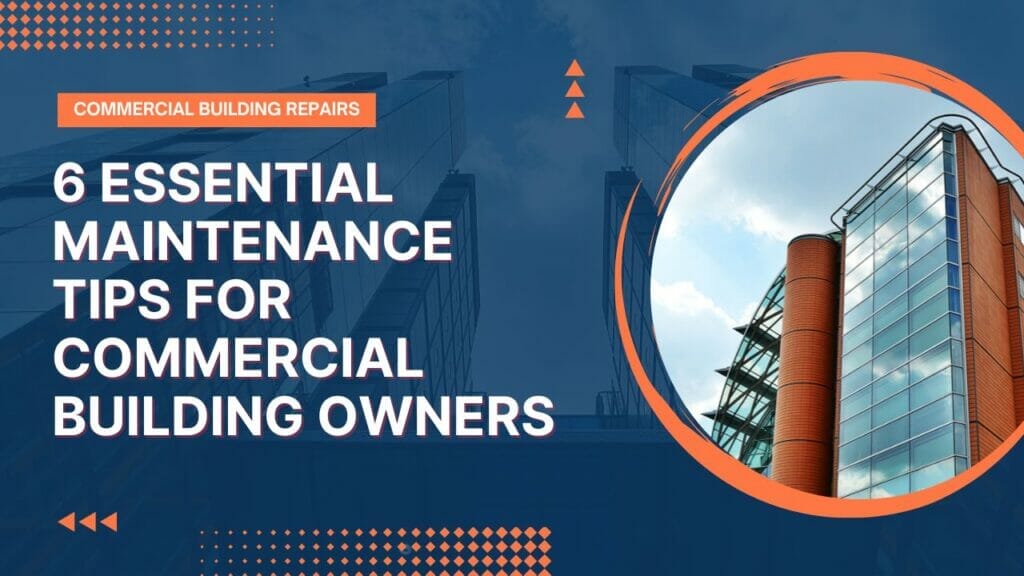Are you looking for basic to pro tips for commercial building owners? We got you! Commercial building owners must prioritize regular maintenance to optimize performance and prevent potential issues.
By implementing these maintenance practices, you can reduce repair costs, enhance safety, and provide a comfortable environment for tenants and visitors.
In this blog post, we will share essential tips for commercial building owners. Let’s explore!

6 Tips for commercial building owners
1. Conduct Regular Inspections
Performing routine inspections is the foundation of effective maintenance for commercial buildings. Try to Regularly assess all areas like –
- The structure
- Roof
- HVAC systems
- Plumbing
- Electrical components
- Safety features
Look for signs of wear and tear, leaks, cracks, or any potential hazards. Make a checklist to ensure comprehensive coverage during inspections.
Identifying and addressing maintenance needs promptly can prevent minor issues from escalating into major problems.
2. Prioritise HVAC System Maintenance
A properly functioning HVAC system is vital for maintaining a comfortable indoor environment. Regularly schedule professional inspections and maintenance for your heating, ventilation, and air conditioning systems.
Clean or replace air filters, check thermostat settings, inspect the ductwork for leaks, and perform necessary tune-ups.
Properly maintained HVAC systems improve energy efficiency, reduce utility costs, and extend the lifespan of the equipment.
3. Preserve and Maintain Roofing
The roof is a critical component of any commercial building. Conduct regular inspections to check for loose or damaged shingles, leaks, or signs of deterioration.
Ensure proper water drainage by keeping gutters and downspouts clear. Schedule professional roof inspections every few years to identify any potential issues early on.
Promptly repair or replace damaged roofing materials to prevent water intrusion and structural damage.
4. Implement a Preventive Plumbing Maintenance Plan
Prevent costly repairs and water damage by inspecting plumbing fixtures, pipes, and drains for leaks or corrosion. Regularly flush water heaters and check for proper functioning.
Have a commercial plumbing service conduct periodic inspections and address any plumbing concerns promptly.
Educate tenants on proper usage and maintenance practices to minimize potential plumbing issues and plumbing myths.
5. Keep Electrical Systems in Check
Ensure the safety and efficiency of your commercial building’s electrical systems by conducting regular inspections.
Check electrical panels, outlets, and switches for any signs of wear, loose connections, or potential fire hazards. Have a licensed electrician perform a thorough inspection to identify and address any electrical issues.
Encourage tenants to report any electrical problems promptly to prevent safety risks and ensure compliance with electrical codes and regulations.
6. Create and Follow a Maintenance Schedule
Establish a comprehensive maintenance schedule that includes routine tasks, inspections, and required servicing for all building systems.
Maintain records and set reminders for upcoming tasks. Regularly review and update the schedule to accommodate changing needs.
A well-structured maintenance schedule enhances organization, reduces oversight, and extends the lifespan of building systems.
Conclusion
If you are really looking to protect your investments and ensure seamless operations. Do follow these 6 Tips for Commercial Building Owners were have just shared with you in this article. It is crucial for all commercial building owners.
Following a well-structured maintenance schedule, you can save money, enhance tenant satisfaction, and preserve the value of your property.
Try to focus on every issue your commercial building has, whether it is a big roof issue or a small ant bothering.
Don’t miss out on the opportunity to maximize your commercial building’s potential. Begin implementing these proactive maintenance strategies now and experience the rewards firsthand. And always choose the right contractor.
Your investment deserves the utmost care and attention, and by following these tips and marketing advice, you’re on the path to ensuring a thriving and prosperous commercial property for years to come.
